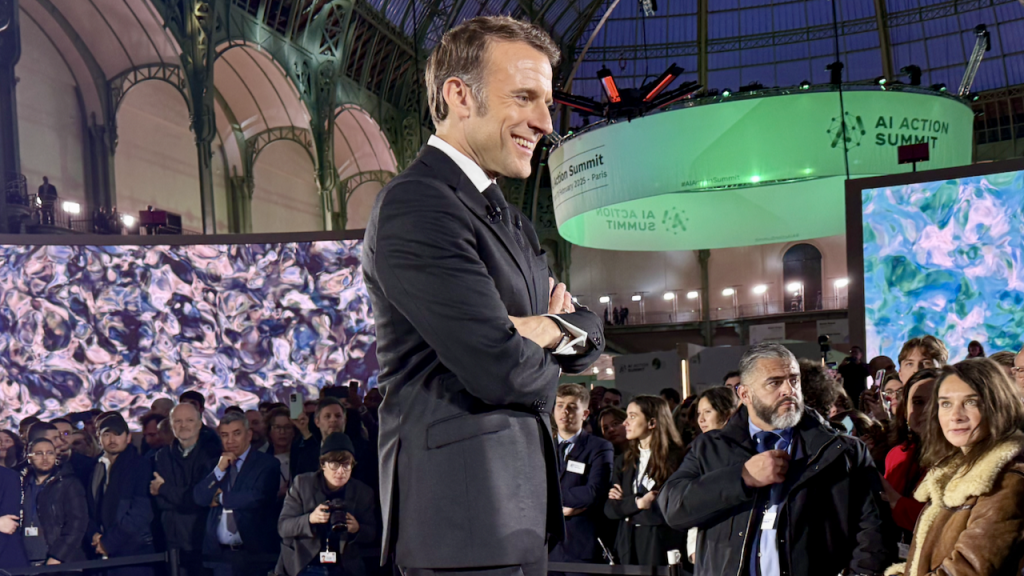What France’s president revealed about European power in a fragmented world

Photo: Author engaging with President Emmanuel Macron at the AI Action Summit, Grand Palais, Paris — February 2025.
When French President Emmanuel Macron addressed the UK Parliament this week—the first European head of state to do so since Brexit—it was more than a diplomatic formality. Delivered in English, rich in symbolism and substance, his speech was a strategic audit of Europe’s posture in a contested world.
Macron didn’t frame it that way. But through the lens of the GRIPS framework, his message comes into sharp focus.
GRIPS: A Framework for National Strength
In today’s era of multidomain competition, a country’s ability to project power depends on more than just military capability. GRIPS provides a five-pillar lens to assess national strength:
- Governance – Can the state deliver legitimacy and coherence?
- Resilience – Can it absorb shocks and resist coercion?
- Innovation – Can it lead at the technological frontier?
- Perception – Does it earn trust and credibility globally?
- Security – Can it deter aggression and safeguard interests?
Let’s apply these five pillars to Macron’s address—and what it signals about Europe’s evolving strategy.
Governance
Macron reaffirmed the democratic values that bind the UK and France, invoking shared commitments to liberty, rule of law, and institutional continuity. His tone—emphasizing unity despite Brexit—showcased France’s effort to reassert strategic coherence across a fragmented European landscape.
While the UK’s departure from the EU fractured institutional alignment, Macron sought to reestablish functional coherence through renewed cooperation. This signals a broader European imperative: preserving legitimacy through pragmatic adaptation.
Resilience
The heart of Macron’s message was economic sovereignty. He warned against overreliance on either Washington or Beijing, criticizing “American tariffs and Chinese subsidies” alike.
“We want to cooperate,” he declared, “but not to depend.”
That phrase reflects the core of economic resilience in the GRIPS model: reducing coercive leverage by diversifying supply chains, deepening regional integration, and investing in self-sufficiency. Macron’s call mirrors Brussels’ recent push for de-risking, especially in energy, critical minerals, and artificial intelligence.
Innovation
Macron highlighted the importance of collaboration on climate technology, AI, and digital transformation—areas where France, and Europe more broadly, hope to stake their claim to global relevance.
Recognizing that Europe cannot compete militarily or demographically with the U.S. or China, Macron pointed to technology, industrial strategy, and regulatory leadership as the region’s chosen levers of influence.
But while the EU has succeeded in setting global standards—from privacy rules to AI risk frameworks—this pursuit of regulatory dominance has come at a cost. The very regulatory rigor that makes Europe a rules-shaper also risks suffocating the innovation it hopes to lead. High compliance burdens, slow-moving approvals, and fragmented market access have hampered European startups and disincentivized scaling in key sectors.
Macron’s framing underscored a central tension: Is Europe’s regulatory ambition enabling its strategic goals—or hindering them? That’s a question we’ll explore in a future post: Mind the Gap.
Innovation is not just about patents or standards. It’s about cultivating an ecosystem where new ideas can thrive and scale. Macron’s speech gestured toward that ambition—but the gap between intention and execution remains wide.
Perception
In a masterstroke of soft power, Macron delivered his address in English, referenced Churchill, and stood beneath a portrait of Queen Victoria. The symbolism was unmistakable: Europe wants Britain back—not in treaty form, but in spirit and alignment.
France, often caricatured as aloof, leaned into strategic empathy. Macron’s tone wasn’t transactional; it was relational. This is perception as statecraft—an effort to reposition France and the EU as trustworthy partners in an uncertain age.
Security
Unsurprisingly, Ukraine featured prominently in Macron’s speech. He reaffirmed support for NATO while pressing for enhanced European defense coordination—not as an alternative to the transatlantic alliance, but as a complement to it.
This dual-track vision reflects France’s long-standing ambition for strategic autonomy: a Europe capable of defending itself while working in tandem with the U.S.
But here lies a crucial tension—and a clear case for the Mind the Gap lens.
Europe aspires to credible deterrence, yet its defense spending remains fragmented, its industrial base underdeveloped, and its collective readiness inconsistent.
The GRIPS question is clear: Can France and Europe translate strategic ambition into deterrent capacity—without weakening alliance cohesion or duplicating effort? Macron’s speech suggests he believes the answer must be yes.
But as we’ll explore in a forthcoming Mind the Gap post, strategic aspiration without institutional and operational alignment creates risk. Europe’s defense autonomy project is no exception.
Europe’s Strategic Moment
Macron’s remarks were not simply about Franco-British relations. They were about Europe’s posture in a fractured world—and the urgency of building strength across all five GRIPS pillars.
Whether or not one agrees with all of Macron’s policies, his speech captured a strategic truth:
A resilient, innovative, and coherent Europe—one that earns trust and deters threats—is not just good for Europe. It’s essential to global stability.
Author
Mark Kennedy
Director & Senior Fellow
